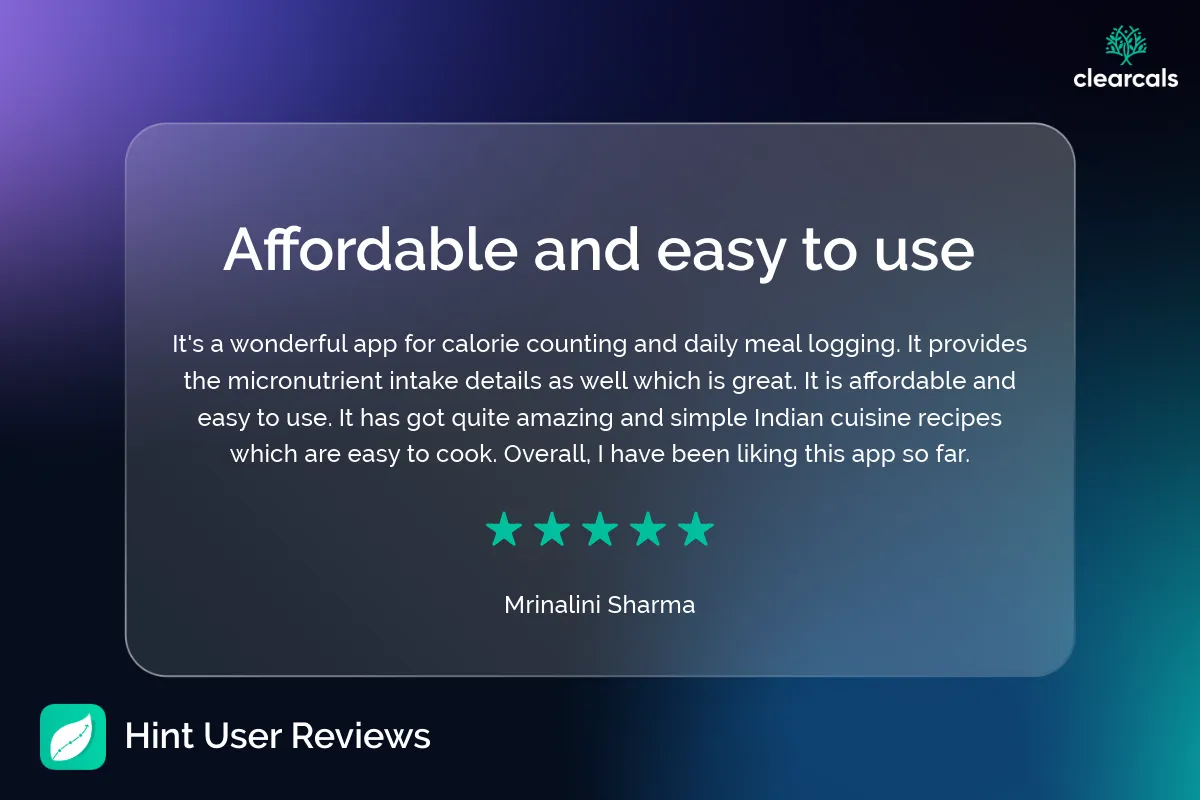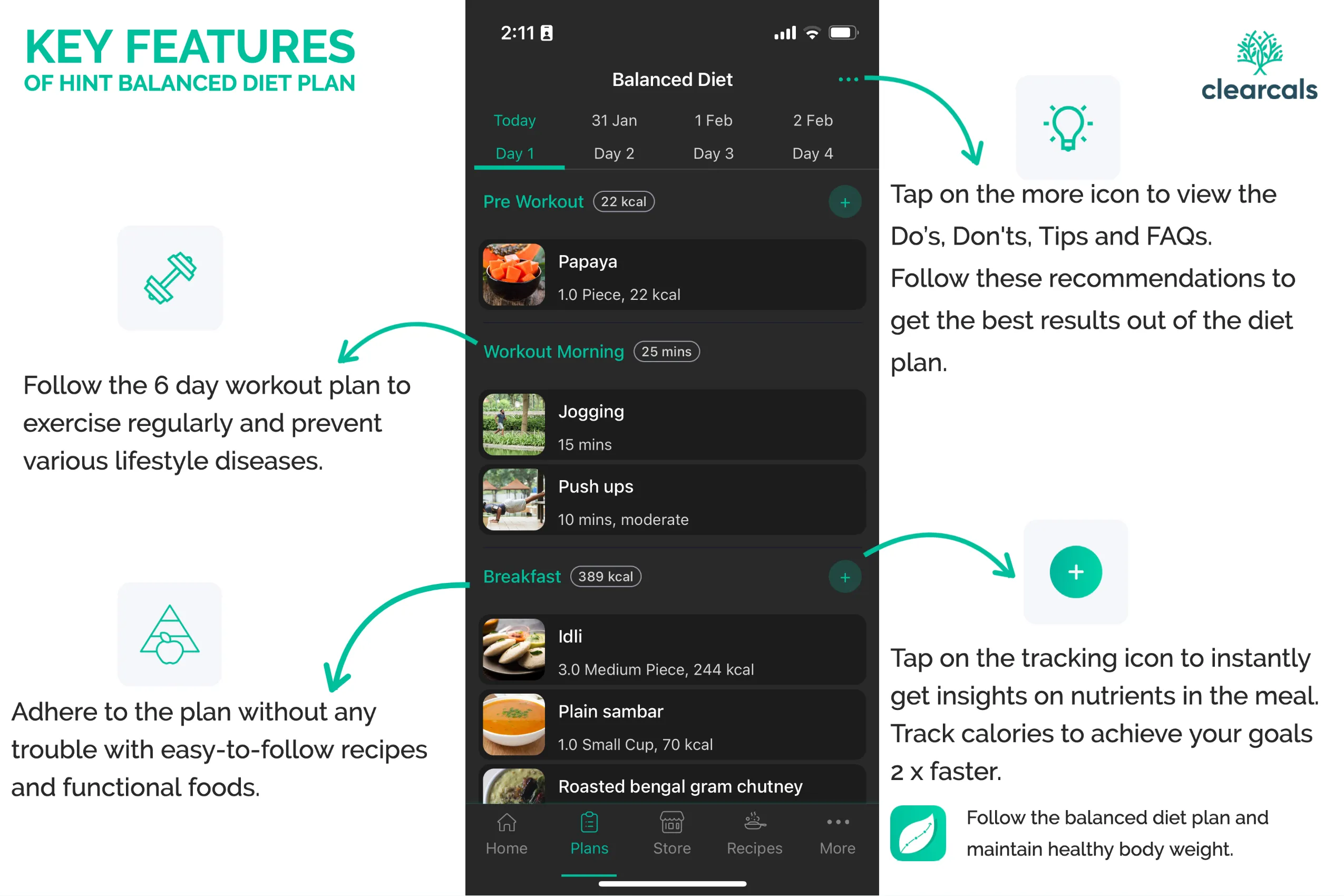Looking for a Personalized Diet Plan?
Balanced Indian Diet Plan

TL;DR
- With the Hint app, maintaining a healthy lifestyle has never been easier.
- Get a personalized Indian balanced diet plan in minutes to help prevent nutrient deficiencies, control cravings, improve stamina, and boost your immunity.
- Discover the do’s, don’ts, and general tips for following this balanced diet plan, and let the Hint app guide you on your journey toward better health.
Overview
Have you ever wondered how you can improve your lifestyle to avoid chronic diseases such as diabetes, hypertension, or PCOS?
The Balanced Indian Diet Plan offered through the Hint app is your answer.
This personalized plan focuses on delivering the right balance of nutrients, helping you achieve and maintain a healthy weight, build stamina, and prevent the onset of various chronic diseases.
With this easy-to-follow diet plan, you won’t need to buy expensive supplements or shakes.
No need for rigorous workouts either, as the Hint app provides a safe and practical workout plan to complement your balanced diet.
By following this plan for at least three months, you can improve stamina, avoid nutrient deficiencies, reduce cravings, and strengthen your immunity.
How to Subscribe to Hint Pro or Hint Premium for Your Balanced Diet Plan:
Download and Install the Hint App:
Search for "Hint" in the Apple App Store or Google Play Store. Download and install the app on your device.
Create an Account or Log In:
Open the app and either create an account or log in with your existing credentials.
You’ll need to provide your profile details, including age, gender, height, weight, and physical activity level, to personalize your Balanced Diet Plan.
Choose a Subscription Plan:
Select "Subscribe to Hint Pro" and choose your preferred plan (monthly, quarterly, or yearly). With Hint Pro, you gain access to your personalized Balanced Diet Plan as well as other plans tailored to your health goals.
For enhanced support, opt for Hint Premium, which includes unlimited consultations with expert dietitians, a customized Balanced Diet Plan, and advanced nutrient tracking to help optimize your health and nutrition.
Enter Payment Information and Confirm:
Complete the subscription process, and gain instant access to your personalized Balanced Diet Plan along with the powerful features of Hint Pro or Hint Premium to support your health journey.

Key Benefits of the Balanced Diet Plan:
- Prevents Nutrient Deficiencies: Ensures you receive all essential nutrients for optimal health.
- Prevents Cravings and Binge Eating: A balanced diet helps stabilize energy levels and prevents unhealthy snacking.
- Prevents Lifestyle Diseases: Lowers the risk of chronic conditions such as diabetes, hypertension, and heart disease.
- Improves Stamina and Boosts Immunity: Enhances your energy levels and supports immune function, helping you stay active and resilient.

Plan Type
This is a monthly subscription plan, which you can renew every month, for three months, or annually, depending on your needs.
Diet Types Available:
The Hint app offers the Balanced Diet Plan in three variations to suit your dietary preferences:
Vegetarian Balanced Diet Plan
This plan is based on plant-based foods and dairy products, excluding eggs, meat, and seafood.
Ovo-Vegetarian Balanced Diet Plan
Includes vegetarian foods along with eggs, but excludes meat, fish, and seafood.
Non-Vegetarian Balanced Diet Plan
Includes a combination of vegetarian foods, eggs, meat, fish, seafood, and dairy products.
Do’s for a Balanced Diet:
- Start your day with a glass of detox water to support digestion and weight management.
- Engage in 30 minutes of physical activity every morning to improve overall health.
- Eat a balanced pre-workout meal 15 minutes before exercise to fuel your body.
- Have your breakfast within 30 minutes post-workout to replenish energy and improve recovery.
- Track your water intake using the Hint app to stay hydrated throughout the day.
- Include almonds and walnuts for added protein and essential nutrients.
- Always eat a raw vegetable salad 10–15 minutes before major meals to increase satiety and control portion sizes.
- Log your food and track portion sizes with the Hint app to stay consistent with your calorie goals.
Don'ts for a Balanced Diet:
- Avoid skipping meals, which can slow your metabolism and increase cravings.
- Don’t consume tea or coffee on an empty stomach, as this can cause acidity.
- Avoid deep-fried or processed foods for all major meals.
- Don’t skip your mid-morning or evening snacks, as this can lead to overeating during your next meal.
- Limit your consumption of high-salt foods and processed meats, as they can contribute to high blood pressure and heart disease.
General Tips:
- Log meals regularly to gain insights into your calorie and nutrient intake.
- Chew your food well to improve digestion and prevent overeating.
- Reduce stress by engaging in hobbies such as gardening, music, or reading.
- Get at least 30 minutes of exercise daily, like walking, to keep your body active.
- Be consistent with your diet and exercise routines to achieve the best results.
- Use the Hint app's reminders to stay on track with meal timings, hydration, and activity levels.

Frequently Asked Questions:
What is a balanced diet?
A balanced diet contains essential nutrients like carbohydrates, proteins, fats, vitamins, and minerals in the right proportions to maintain good health. With the Hint app, your Balanced Indian Diet Plan will be customized to your specific needs.
Why should we eat a balanced diet?
A balanced diet prevents nutrient deficiencies, supports weight management, and reduces the risk of chronic diseases like diabetes and hypertension.
What are the components of a balanced diet?
A balanced diet includes carbohydrates (50–60% of total calories), proteins (10–20%), and fats (20–30%). The Hint app helps track these nutrients, ensuring you’re hitting the right targets.
How can the Hint app help me maintain a balanced diet?
With Hint Pro and Hint Premium, you can track your calories, macronutrients, and even your water intake. You’ll also receive personalized weekly reports to monitor your progress.
What are the long-term effects of a poor diet?
A poor diet can lead to obesity, nutrient deficiencies, diabetes, and increased risks for heart disease. Using the Hint app, you can prevent these outcomes by following a personalized, balanced diet plan.
How much sleep do I need for a healthy lifestyle?
Aim for 7 to 8 hours of sleep per night to maintain a healthy lifestyle. Quality sleep is essential for recovery and well-being.
Final Thoughts
Following a Balanced Indian Diet is key to improving overall health, building stamina, and reducing the risk of chronic diseases.
With the Hint app, you have instant access to a personalized diet plan that fits your lifestyle and dietary preferences.
Whether you choose Hint Pro for advanced nutrient tracking or Hint Premium for unlimited consultations with expert dietitians, the app offers all the tools you need to achieve your health goals.
Start today by downloading the Hint app, subscribing to the Balanced Diet Plan, and taking control of your health journey.
By staying consistent and making healthy choices daily, you’ll soon notice the positive impact of a balanced diet on your overall well-being.






